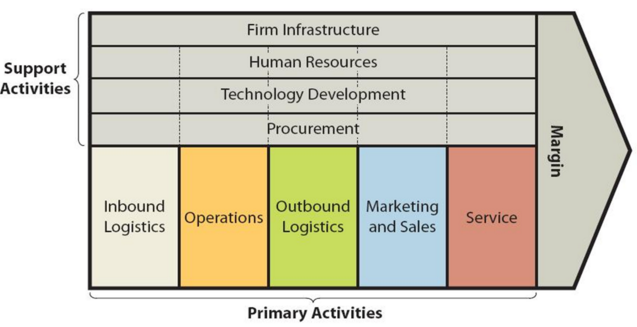Red Bull Value Chain Analysis
Red Bull value chain analysis is an analytical tool that can be applied to identify business activities that can create value and competitive advantage for the company. Figure below illustrates the essence of value chain analysis:
Primary Activities
Inbound logistics
Operations
With more than 5.9 billion cans sold in 2015 alone[1], the scope of Red Bull operations is extensive. The Red Bull flavouring is still produced in Bangkok and exported into manufacturing plants internationally. Wall-to-wall manufacturing technique is one of the main sources of value for Red Bull in operations primary activity. Wall-to-wall manufacturing technique involves manufacturing and filling cans on the same site and saving 8,750,000 km of truck travel annually, with highly positive implications from financial and environmental points of view.[2]
Outbound logistics
Red bull is sold in more than 169 countries[3] and its outbound logistics represents a complex system reflecting the size of the business. Red Bull Energy Drinks travel to their destination predominantly by train and ship. The company uses trucks only when it’s absolutely necessary. The use of train and ship is more cost-effective compared to trucks and this one of the important points in Red Bull value chain in outbound logistics.
Red Bull cans are 40 per cent more space effective and 30 per cent more space effective compared to glass bottles and PET bottles containing the same quantity respectively[4]. Therefore, shape and light weight of Red Bull cans makes transportation much easier, an additional considerable source of value chain in outbound logistics operations.
Marketing and sales.
‘Red Bull gives you wings’ represents an essence of Red Bull marketing communication message. This message is transmitted via a wide range of marketing communication channels on print TV and online platforms. Red Bull Media House five print magazines, one TV channel and an online TV channel. Moreover, the company owns a number of sports teams such as RB Leipzig, FC Red Bull Salzburg, Red Bull Brasil, and New York Red Bulls to promote the brand in indirect manner. Red Bull sells its energy drinks only via distributors and resellers such as supermarket chains, bars and restaurants and other outlets.
Service
The company offers a limited scope of post-sale service due to the nature of the industry and the product. The official website of the company contains a contact page where customers and other stakeholders contact the company regarding various issues. Also, there are regional customer service contact details to be used by customers and the general public if needed.
Red Bull GmbH Report contains a detailed discussion of Red Bull Value Chain Analysis. The report also illustrates the application of the major analytical strategic frameworks in business studies such as SWOT, PESTEL, Porter’s Five Forces and McKinsey 7S Model on Red Bull. Moreover, the report contains analysis of Red Bull marketing strategy, leadership and organizational structure and discusses the issues of corporate social responsibility.
[1] The Company Behind the Can (2016) Red Bull, Available at: http://energydrink-uk.redbull.com/company-profile
[2] Can Lifecycle (2016) Red Bull, Available at: http://energydrink-uk.redbull.com/red-bull-can-lifecycle
[3] The Company Behind the Can (2016) Red Bull, Available at: http://energydrink-uk.redbull.com/company-profile
[4] Can Lifecycle (2016) Red Bull, Available at: http://energydrink-uk.redbull.com/red-bull-can-lifecycle


